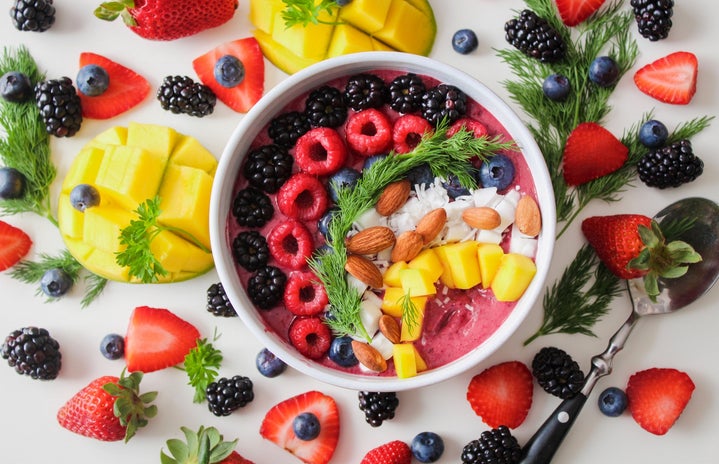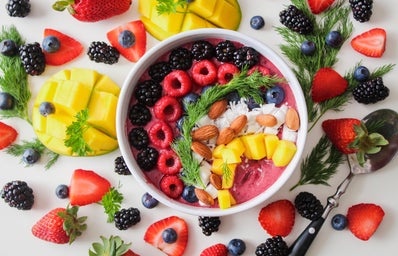Eating healthy is such a ‘duh’ thing because we all know the benefits of eating healthy. From a young age, we are all taught to eat plenty of fruit, vegetables, and to avoid sugar and fast food. However, eating healthy is actually a lot harder than we think, especially because not everyone can afford to eat organic foods. Here are some ways to implement healthier foods into your life as well as helpful substitutions for a lot of common fast foods!
- Brown Everything
-
Eat brown rice instead of white, and multigrain over white bread. Did you know bleached flour is banned in Europe but still legal in the US? This flour is bleached with food additives such as chlorine, bromates, and peroxides. The same goes for salt and sugar—choose brown sugar over white and try to buy other kinds of salts such as pink Himalayan salt or black.
- Buy Fresh Whenever Possible
-
Buying fresh fruit and vegetables ensures no additives and preservatives are being added. As mentioned earlier, buying organic fruits and vegetables can be expensive, but good news, there has been no major difference found between organic and conventionally grown food according to Harvard Medical School. Most frozen fruits and vegetables are just as good, but make sure to read the ingredients to confirm it’s just the fruit and vegetables in the bag and nothing else.
- Cook Your Own Meals
-
By cooking your own meals, you know exactly what is going into your body, and you can adjust the amount of sugar and salt to be added. You have the most control over what you eat this way. Eating prepackaged foods can be low in nutritional value, and have way too many additives and sugar/sodium content. They also taste bland and strange in my opinion. If you don’t have time to cook, YouTube has thousands of videos on very quick and easy recipes to try! When in doubt, ask the internet.
- Consider Ditching the Soda
-
I quit drinking soda around 4 years ago and do not miss it. Soda is just sugary carbonated water that contains 0 nutrition and a lot of sugar and calories–diet soda is not any better either. Although diet sodas contain no calories nor sugar, it is linked to diabetes and heart disease in several research studies. The artificial sweeteners can also cause havoc on your brain and desensitize your taste buds. If you are craving something carbonated and sweet, there are many sugar-free/naturally flavored drinks.
- Fast Food Substitutions
-
Thanks to the growing movement of eating clean, organic, and healthier, there have been so many different alternatives to many fast food snacks. For example, if you are a fan of Cheetos, try the Hippeas® Organic Vegan Chickpea Puffs, which are made of clean ingredients and chickpeas! They taste just as good with the extra benefit of being healthier. The hyperlink will take you to their official website, but I recommend going in-store or checking them out on Amazon for cheaper price options.
Another snack I have also been loving is Lukes Organic Cheddar Cheese Snacks. They are made of multigrain flour and clean ingredients, but you can’t even tell the difference between these and other similar fast food snacks! They are also very affordable ($3.29 for a 4oz bag). If you love potato chips, try out the Masai plantain chips, which are highly addicting but still a good alternative to potato chips. They have a lot of flavors. My favorite is the jungle chili.
Enjoy burgers and fries? Try making those from home too! If you don’t have an air fryer, I would highly recommend getting one to reduce the amount of oil in your food.
If you have a sweet tooth, try baking yourself to control the amount of sugar you are adding to your food. Also, try to eat more fruit, and it doesn’t mean just apples. Play around with the variety! Eat peaches, berries, pomegranate, dragonfruit, grapes, etc. Look up sugar-free or low sugar dessert options online to try out and improve your baking skills!
- Read the Ingredients
-
This is extremely important because it’s very easy to miss. If there is something you cannot pronounce or don’t know about, look it up on google before buying. A lot of ingredients in the foods we eat are often used in other commercial products that are not made to be consumed. For example, bisphenol A is a common chemical found in many plastics and canned foods. Because this ingredient is also found in plastics, it is highly, highly recommended never to microwave plastics as this can leach BPA into your food. Ramen is also unhealthy because it contains tertiary-butyl hydroquinone (TBHQ), a petroleum industry byproduct preservative. These are only a few of many examples of ingredients to be aware of. Remember, if you don’t know what you’re eating, look it up first, or leave the product alone.
- Watch the Dietary Information
-
When I started paying more attention to the amount of sugar and sodium in my foods, it became more evident how easy it is to eat more than the recommended amount. For example, in a 16 oz mountain dew, there are 58 grams of sugar, which is 14.5 teaspoons of sugar, which already more than half of the daily recommended amount of sugar (24g per day). It is also just as easy to have a lot of sodium, which can cause damage to your kidneys and increase one’s risk of elevated blood pressure over time. Pay attention to the number of fats, sugar, and sodium that’s in your food as it can be easy to go over the daily allowance. Now that you are more aware of how to spot weird ingredients and watch for sugar and sodium levels, substituting your favorite foods with healthier ones will not only promote better health but will also ensure you know exactly what is in your food and can make better choices.
These are a few examples to demonstrate that it is possible to eat your favorite foods in a cleaner and sustainable way. It never hurts to indulge in unhealthy food once in a while, but by taking the time to be mindful of what your overall diet is, you will feel a lot better and healthier by taking better care of your body. After all, you are what you eat, and there are thousands of primary research articles that talk about the importance of good food in cancer and disease prevention. Don’t forget to drink plenty of water!


